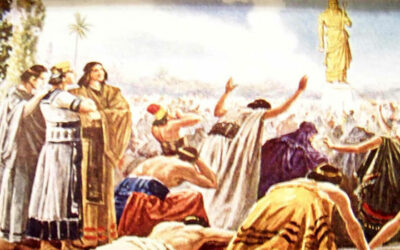Originally, the promise was for the nation of Israel, but ultimately, it was fulfilled in the Ekklesia. The temple of God in Jerusalem never allowed itself to be a house of prayer for “all nations”; only Jews were permitted to enter (Acts 21:28). Archeologists have found markers around the boundary of the Temple grounds bearing this inscription: “Any foreigner who ignores the warning and goes beyond this point shall have no one but himself to blame for the death which shall be his penalty.” So the passage in Isaiah was never fulfilled in Israel, but it is fulfilled in the Ekklesia, as a holy nation of priests (I Peter 2:9).
Jesus also alludes to Jeremiah 7:11: “Is this house, which is called by My Name, become a den of robbers in your eyes?” The physical temple came to represent something other than the purpose for which it was created. Thus, the Lord Jesus, in word and in deed, demonstrates that He no longer considers the physical temple as His House, but calls it a “den of thieves”, thus establishing a new House, built upon the foundation of Himself (Matthew 16:18).
Today we know that the Body of Christ is the Temple of God (I Peter 2:5,6). As such, the Ekklesia stands on the earth before God and on behalf of men. One of its tasks is to be a house of prayer for all nations. This means the Ekklesia is a place where people of all nations may find fellowship with God, and it also means that the Ekklesia is a place where prayer is offered up to God on behalf of all nations. It is this second meaning that we want to focus our attention on.
The Executive Privilege of the Ekklesia
Prayer is based on communion and fellowship with God. That is the foundation for all prayer, supplication, intercession, and thanksgiving. We cannot really pray if we do not have a relationship with God to base our praying on. This is what sets the Ekklesia apart from many religions that treat prayer as an impersonal formality which one must perform in a ceremonial, detached way. Our prayer is so much more than that, but at the same time, it goes beyond communion and fellowship. It includes communing with God, but also includes discerning what He wants, agreeing with it, calling it forth, and submitting ourselves to it (this is the key) IN ADVANCE of its fulfillment. In fact, being able to know what the Lord wants and what He is doing is one of the privileges of being a friend of God (John 15:15; Genesis 18:17; Exodus 33:11a).
God has decided that He will not act apart from the prayers of the saints. We know that apart from Him, we CAN DO NOTHING. We also need to know that apart from us, God WILL DO NOTHING. So He bids us to pray, “Thy Kingdom come, Thy Will be done, on earth as it is in heaven (Matthew 6:10).” God is concerned for the earth, and calls upon the Ekklesia to join together with Him in bringing His Will to pass. Towards what end are we praying? That God’s Kingdom and God’s Will would be manifest in the earth. In heaven, God’s Will and God’s Kingdom are already established (Psalm 119:89). Even though God has placed everything beneath the feet of Jesus Christ, here, in the earth, we do not yet see all things submitted to Him (Hebrews 2:8). There is a chasm that exists between God’s stated purpose of “all things in Christ” and life on earth as we see it today.
Today, Scripture acknowledges, we do not YET see all things submitted to Him. I must say I find that word “YET” terribly exciting! That word “YET” means that something is in store for everything that remains unsubmitted to the Lord Jesus Christ. The presence of the word “YET” means its manifestation is inevitable, and the futility of resistance is illustrated for us in Psalm 2:
“Why do the heathen rage, and the people [nations] imagine a vain thing?” (v.1)
The “vain thing” is the mistaken belief that the nations of the world can somehow escape the inevitable fulfillment of “all things in Christ”. David clearly sees Christ as ruling the nations with a rod of iron. Again, this is a future fulfillment, but this sheds new light on what is means to “bridge the gap” in prayer. It is not merely bridging the gap between God and man. In a very real sense, the Ekklesia is the means through which the gap between God’s Will and Earth’s Reality is brought into alignment, until Christ has the manifest preeminence over all things (Colossians 1:15-18). In that day, WE WILL SEE all things submitted to Him. Can we begin to imagine what that will look like, and what it will take to bring the nations of the world to that point?
A word of caution: we should distance ourselves from the idea that this can be achieved simply by electing Christians to the highest offices of each nation. Such thinking is erroneous. The Ekklesia is not going to take over the earth, but will inherit the earth, by way of meekness and submission to Christ as All in All, and not by seizing earthly power or government (Psalm 37).
“We do not YET see all things submitted to Him; BUT we see Jesus.” We do not live by what we see, but we live by faith. It would be a mistake to assume that just because one does not YET see all things submitted to Christ that He then must not really be Lord of all. This costly mistake will be the undoing of the multitudes. We are not pretending to see something that does not really exist – yes, we agree that we do not YET see all things submitted to Him, things are bad, and will probably get worse; BUT we do see JESUS, and for the Christian who seeks first the Kingdom of God, that revelation is sufficient. You may see every fact to the contrary and argue against Him, but we see Who He is by revelation, and by revelation we know that what we see happening in the unsubmitted earth today will be set in order when Christ and His Kingdom are manifest in all of creation.
The Ekklesia is meant to represent to the earth what the preeminence of Christ means, and remains on the earth as the vehicle through which God may find expression for His Purpose. Hence, Christians are not immediately carried off to heaven when they are saved. Instead, we remain on the earth as salt and as light (Matthew 5:13,14), the salt being a preservative, and the light being a witness to the Truth. What Truth? That Jesus Christ is Lord, not just in heaven, but in earth, for:
“[God] raised Him from the dead, and set Him at His own right hand in the heavenly places, far above all principality, and power, and might, and dominion, and every name that is named, not only in this world, but also in that which is to come: and hath put all things under His feet, and have Him to be the Head over all things to the Ekklesia, which is His Body, the fulness of Him that filleth all in all (Ephesians 1:20-23).”
When we see this, when we order our prayers around this, and when we live our lives in such a way that shows we believe it and demonstrate the reality of it EVEN THOUGH WE DO NOT “YET” SEE IT, then we are properly bearing the Testimony of Jesus in the earth.
Some Considerations to Be Made
Someone might ask if God wants His Kingdom to come and His Will to be done, why does He not just do it? Why do we have to pray for it to be done in order for it to happen?
There are many questions along these lines that could be asked. For example, the Lord says we should pray for our daily bread (Matthew 6:11). But if the Lord loves us and promises to supply our needs, why must we ask Him every day for our bread? Again, the Lord says, “Ask, and you will receive. Seek, and you will find. Knock, and the door will be opened (Matthew 7:7).” We might wonder why, if God knows what we need already, is it necessary for us to ask Him? If He wants us to find something, why does He not just reveal it to us – why do we have to seek it? If it is His Will for a door to be opened, why do we have to knock?
The Lord tells His disciples, “The harvest truly is great, but the laborers are few. Pray ye therefore to the Lord of the harvest, that He would send forth laborers into His harvest (Luke 10:2).” If the Lord knows that more workers are needed, why does He not just send in more workers? Why would He wait until we ask Him to do something before He does it?
We believe the answer to these questions is based upon the fact that God wishes to do nothing apart from the Ekklesia. This is in contrast to a kind of attitude that passively accepts whatever happens and just believes that everything will take care of itself. This sounds like faith, but it is really not. It is a subtle form of laziness. We cannot really have true faith until we have prayed, and prayer is active dependence, not passive dependence. Passive dependence will say, “We can never know or understand God’s mysterious ways, so we just leave it up to Him to do as He sees fit. Whatever will be, will be. We will just make the best of whatever happens.” This will open the door for all kinds of unnecessary satanic affliction. This is not faith.
A similar kind of passivity says, “If it is meant to be, it will be. If God means for me to do a certain thing, then everything will line up the way it should. And if God does not mean for me to do it, then no matter what I do, I will be unable to perform it. So there is no great need to pray.” If this were the case then daily bread would automatically come to us, and doors would automatically open, and workers would automatically go forth into the harvest. And If these things happened of their own accord, regardless of whether we prayed or not, then everything Jesus taught us about prayer is superfluous. Jesus taught us to always pray, and not quit (Luke 18:1).
The truth is that God HAS revealed His Will to us, the Spirit WILL make His Mind known to us if we ask, and we are thus instructed to cooperate with God by praying specifically for His Will and for His Kingdom to be accomplished. The fact that God has promised to provide us with daily bread, open doors, and workers for the harvest is intended to inspire us to ask for these things to be done and to give us a basis upon which we may reasonably expect God to bring it to pass. Prayer brings us to a place where we can know and trust God, and can become acquainted with His ways. It also enables us to learn what it means to overcome, and to share in His glory. He wants us to come to Him, to know Him, and to agree with Him through prayer so that He may perform His Will. Beloved, it takes more faith to pray than it does to remain passive.
Many things are left undone, not because God does not desire to do them, but because we have not joined with Him in cooperative prayer; hence, prayer is the most vital work of the Ekklesia, more important than preaching, witnessing, or gathering together. Apart from prayer, nothing happens, and if there is to be any measure of success or blessing in the Ekklesia it will be because someone, somewhere, has prayed. Concerning the critical nature of prayer, Watchman Nee says, “If anyone will rise up and devote himself to the work of prayer exclusively, how excellent that will be. God is waiting for such ones to work together with Him so as to enable Him to finish His work. Some Christians may ask why the Lord does not save more sinners, why He does not cause every believer to overcome. I sincerely believe that He would undoubtedly do such works if people would only pray.”
By the same principle, many things which should not be permitted are indeed permitted, not because God would necessarily want them to occur, but because the Ekklesia has allowed it to be so. We ask why God would allow such and such. We should ask ourselves why we would allow such and such, and why we have not prayed as we ought. We represent Heaven’s Will on earth, and if that Will is not executed, the reason lies with us. Now it is impossible to judge each particular thing and determine why it was permitted or why it was not permitted. We are not trying to blame anyone for anything. We do want to stress that it is the responsibility of the Ekklesia to bind and to loose what heaven would have bound or loosed (Matthew 18:18,19). Some things are unavoidable, but through prayer, the Ekklesia can lessen the negative impact such events would otherwise have. Many things ARE avoidable if we pray about them in advance.
The Work of Prayer
Before we can really be effectual in prayer there is a lot of preliminary work IN PRAYER to be done. Eventually one realizes that we literally have to pray about prayer. We have to fight just to secure a place and a time to be alone with God. We are not talking about communion and fellowship, for this can and should be done throughout the day as we attend to our responsibilities. But there is a specific time and place and appointment we must have with God that must, by its very nature, cancel out and override whatever else we may be doing at the moment. If we are not diligent to “pray about praying” then we will find ourselves going along for several days and then realizing that we have not really prayed in awhile.
Then we must pray about HOW to pray, and this represents another battle. All the praying in the world will do no good if we are not praying correctly, that is, according to the WORD, according to how Jesus TEACHES us to pray (Luke 11:1-4). If we are not praying according to His WILL, our prayers are in vain. I recently asked a sister what she wants, and she replied, “I do not know what I want, because I do not know what God wants.” This is very wise, and God will be sure to reveal His Will to a person with this perspective.
Thus, prayer is more than making requests to God, it is waiting before God to discover what requests ought to be made. This is what it means to “watch and pray.” In order to learn HOW to pray, it will take a few good seasons of learning how to watch, wait, and listen for the prompting of the Holy Spirit, Who will help us pray according to the Mind of God (Romans 8:27). Watching and praying go together, and the one who cannot watch cannot pray.
Next, there is the battle to know, discern, perceive, intuit, and fathom God’s Will: His overriding, all-inclusive purpose for all creation; His desire and goal for the Ekklesia; and His individual direction for each one of us as individual disciples and followers of Jesus. That is quite a range of things, and we should not expect to understand it all in one day or in one week. But if we will seek Him and His Will in all things then He will begin to give us insight into them, because truly He works “all things together for good according to His Purpose.” And what exactly IS His purpose? The preeminence of Christ. And how does that factor in this matter, and that matter, this thing, and that thing? THAT is precisely what He wants to show us as we pray.
Finally, there is the struggle to submit one’s self to the revealed Will of God once we know what it is, and this is by far the most intense part of the battle. Everything hinges on this. David fasted and prayed for his child, laying upon the ground for seven days and nights. But once the child died, the Will of God was no longer a question mark over the matter, it was a period. How did David respond? Was he disappointed? Angry? Bitter? No – he was SUBMITTED. As soon as he heard the child was dead, he arose from the ground, bathed, changed his clothes, went into the house of God to WORSHIP, returned home and broke the fast by eating a meal (II Samuel 12:20). When questioned, his response was, in effect, when I did not know God’s Will, I prayed and fasted; but now that I know it, why should I keep pleading with God to do what is contrary to His Will?
When we reach this stage of prayer it is time for surrender, not striving. Then it is proper to say, “I will accept whatever happens now.” We cannot say that if we have not yet prayed, but if we HAVE prayed then there is nothing else TO say. I suggest that the greater part of David’s seven day fast was spent coming to terms with God’s Will. Only a man so surrendered could have remained so serene.
The Cross is Central to The Work of Prayer
Precisely how does a human being, with all their feelings and emotions, relegate his (or her) natural sense, ignore what his eyes and ears tell him, and really get into a place in God where he can pray in cooperation with God’s Will? What we have called “taking up the Cross” is now about to hit home for many of us who have held it as a mere doctrine, but not an experience. For only someone dead to himself can do it, and this is exactly what the Cross is meant to accomplish in the life of the Christian. The very struggle itself is necessary, not too unlike the baby bird which must struggle with its own shell before it can be free of it. We see this pointedly illustrated in the Garden of Gethsemane by Christ Himself, when He prayed:
“Father, if it be possible, let this cup pass from Me; yet not My will, but Your Will be done (Matthew 26:39).”
His sweat mingled with His tears, and He wrestled with Himself three times before He could settle the issue, but once it was settled, He gave no resistance, and within a few hours everything was accomplished. Oh! That is where we are lacking today! How long will we kick and struggle against the pricks? How long will we argue and complain against God and resist His dealings with us? If we have to die in order to truly live, let us be about the business of dying! If we must be crucified in order to have Resurrection Life, then let us just submit to it and get it over with!
Some very telling features are found in this passage and in the ones related to it. We see at once that there is a thing called God’s Will, and there is a thing called My Will. If this was true of Jesus, believe me when I say it is abundantly true of us. Forget about the devil for a moment, this issue of God’s Will versus My Will is one hundred thousand times more intense than any fight with some devil or demon. God’s Will and My Will are not always in agreement, and that is going to be a problem for God and for me until it is resolved. How can I represent His Kingdom in the earth and talk about His preeminence over all creation if He does not have the preeminence in my own life?
HENCE THE PURPOSE OF PRAYER: to get aligned with the Mind, Will, Heart, Desire, Purpose, and Aim of God Himself. It is a fight and a struggle just to get to Gethsemane. It is a battle to get your brethren to stay awake with you for even one hour; and it is an all-out war to “pray thrice” or ten times or twenty times or one hundred times, as the case may be, until you have gotten the victory over yourself, and come away soaked with the blood, sweat, and tears of that early morning wrestling. But once the outcome is decided in God’s favor, what awesome power and Life one receives, to drink that Cup that looked so impossible before, and to go forth bearing the Cross in the strength and power of God Himself, to do whatever He requires!
Admittedly, the kind of prayer we are calling the Ekklesia to will require a great deal of self-denial and work, more work than most of us are accustomed to, and for that reason the majority of people who read this will give it up as too laborious. Like the disciples who fell asleep, some simply cannot stay awake (literally or figuratively) to watch and pray for any length of time. This is due in part to the “lazy man’s” way of praying that we have been taught and have followed for so long. Now we are not talking about how many hours per day you should spend in prayer. You can be effectual and fervent for twenty minutes per day, and you can be totally ineffectual and half-hearted for several hours straight. Which fulfills God’s purpose? We need to work on the quality of our intercessions first and foremost, and then we can work on the quantity of them.
Thus, a serious call to prayer and fasting involves something more than an occasional prayer meeting, an hour-long prayer vigil, or an occasional skipped meal or two. It is a call, not to the world in general, but to the Ekklesia, for it is the Call of the Cross all over again: to give no place to the flesh, even in prayer; to subjugate all that pertains to the natural man; to get aligned with something larger and bigger than myself; to get one’s own house in order; to bring a message of warning AND mercy to the unsubmitted earth; to prepare the way for the preeminence of Christ, and to demonstrate that preeminence to the rest of the world. Towards this End, we pray that the Lord will raise up more of the saints to represent His interests as the House of Prayer for All Nations.












